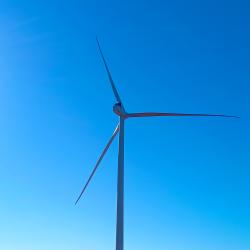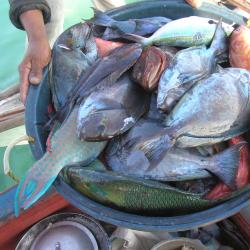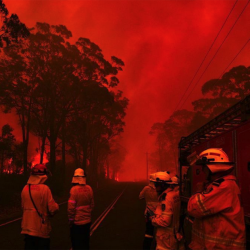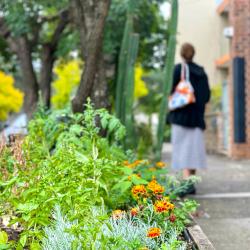Our research spans a wide range of projects. These themes are strong areas of focus.

Climate justice and energy transitions

Driven primarily by the combustion of fossil fuels as the foundational energy source of industrial societies, the disruption of the planetary carbon cycle and its consequences - global heating, ocean acidificiation, extreme climate phenomena and ecosystem deterioration - is the greatest threat we face as a civilisation. Until recently climate and energy policy discourse was dominated by technical debates around science and orthodox economics. Recognising that those who have benefited least from fossil-energy intensive development are often also those most vulnerable to the impacts of climate change, the concept of climate justice gained political traction in the early 2000s and is now dominant in social movement and NGO discourse, and at UN climate conferences. With the growing present-day impacts of climate change, policy discourse is now centred on intergenerational ethics, as global mobilisations of youth and Indigenous people have foregrounded the right to a viable future and the preservation of the planet for our children, grandchildren and future generations.
The idea of climate justice has developed expansively, informing and transforming a wide range of academic research disciplines, policy institutions and civil society projects. These encompass the local and global politics of equitable energy transition, the challenges of halting fossil fuel extraction and establishing renewable energy infrastructures, the urgency of addressing the immediate social and ecological impacts of climate change, including the impact of climate anxiety, the ongoing need to overcome misinformation and climate policy obstruction, litigation against fossil fuel extraction and government inaction, efforts at decarbonising finance and at charting proactive decarbonising agendas, via just transitions to energy democracy and ‘green new deals’. Centre members seek to expand and transform the frontiers of climate justice research to support the theory and practice of energy democracy, and are engaged in research, often with external partners, across many of these fields.
Fisheries, maritime and coastal communities

Photograph: Michael Fabinyi
Marine resources provide food to urban populations and livelihoods to coastal communities, whose lifeworlds are under pressure from the combined effects of rapid social change, overfishing, illegal and destructive harvesting methods, industrialisation of the sea including offshore mineral and hydrocarbon extraction, geopolitical tension over coastal/oceanic spaces and the rising sea temperatures and ocean acidification driven by climate change.
C-SERC researchers specialise in researching fisheries and aquaculture, maritime environments and societies, and the political, cultural and economic practices related to these, from local sustainable development and marine conservation and restoration initiatives through to maritime security and global governance themes such as the Blue Economy. Our researchers are recognised for their expertise in the Asia-Pacific region, including Australia, China, Indonesia, Japan, Papua New Guinea, Philippines and the Solomon Islands.
Indigenous land and justice

Photograph: Dean Sewell, Sydney protest
The rights, interests and knowledges of Indigenous communities are now at the forefront of debates around climate and environmental policy.
We engage in scholarship that is driven by Indigenous interests, collaborating with First Nations scholars and communities in Australia and worldwide. Drawing on comparative Indigenous history to contribute to nation-building, sovereignty and self-determination, key areas of research are land and water rights, the effects of climate change and extractivism on Indigenous lands and communities, the contribution of Indigenous peoples to environment and heritage management, and prospects for renewable energy development and sustainable resource management on Aboriginal land.
Work, climate and environment

Photograph: Dean Sewell, Green Wattle fire
Environmental change, including climate change, is most directly felt by people who cannot escape its impacts. Climate change is contributing to higher average temperatures, higher humidity, longer heatwaves and disrupted weather, as well as more intense drought, storms, floods and bushfires. Millions of workers worldwide, are directly affected, including through an epidemic of work-related ‘heat stress’. Climate change is fast becoming an urgent public health issue and a major threat to safe and decent working conditions. In 2019 the ILO stated reports that without action to arrest the problem climate impacts would ‘destroy jobs and livelihoods on an unprecedented scale’.
Researchers at the centre have been partnering with trade unions and think tanks to advance new research into how to tackle these issues on the ground in workplaces and through policy action.
Civic ecologies, healthy environments and urban transformations

An edible verge garden in Green Square. Photograph: Ilaria Vanni.
The majority of the world's population now live and work in cities. Whilst the challenges faced differ greatly between North and South, civic engagement and ecological stewardship of urban spaces is increasingly crucial to the capacity of societies to transform the infrastructures of everyday life in response to the causes within and effects upon urban communities of climate change and ecological erosion.
C-SERC members are currently researching the efforts of urban communities to reimagine more sustainable urban ecologies and infrastructures, as well as the ways in which the rise of temporary, informal, and irregular employment intersects with the impacts of climate change: such as the impact of extreme heat events on workers in the home care, education, health care, logistics, agriculture and manufacturing sectors.
Banner photograph: Dean Sewell

